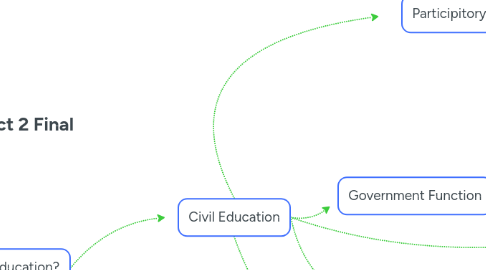Project 2 Final
by George Drury

1. What is Education?
2. Civil Education
3. Liberal Arts/Humanities
4. Government Function
5. Laws
6. STEM
7. science
8. technology
9. Engineering
10. Math
11. Cold war
12. popularization STEM field
13. Government funding of STEM education
14. Civil education put on backburner
15. Poor education and funding of civics
16. Vocational paradigm
17. inflated value in STEM education, prioitizing it over other areas of education
18. Participitory Readiness
19. Civil agency
20. Disinteresed deliberation
21. prophectic work
22. Fair Fighting
23. Gathering in assembly to solve problem
24. rhetorical power and ideas to shape public
25. Civil discussion
26. MLK
27. Ancient Athens
28. Working together not agianst eachother
29. Humanities students more likley to prticipate in democracy than STEM
30. Education forcused on workforce
31. Led to inequality in opprotuniity in workforce and school
32. "92.8 percent of humanities majors have voted at least once since finishing school. Among STEM majors, that number is 83.5 percent
33. The reliance on an exclusively vocational paradigm as the sole guide to education policy-making is a failure to meet the legal standard for securing a basic right
34. "44.1 percent of 1993 humanitities graduates had written to public officals, compared to 30.1 percent of STEM majors
35. Debates, Council meetings
36. Early womens rights activists
37. Engineering and the development of rockets
38. Protested out against Inequality


